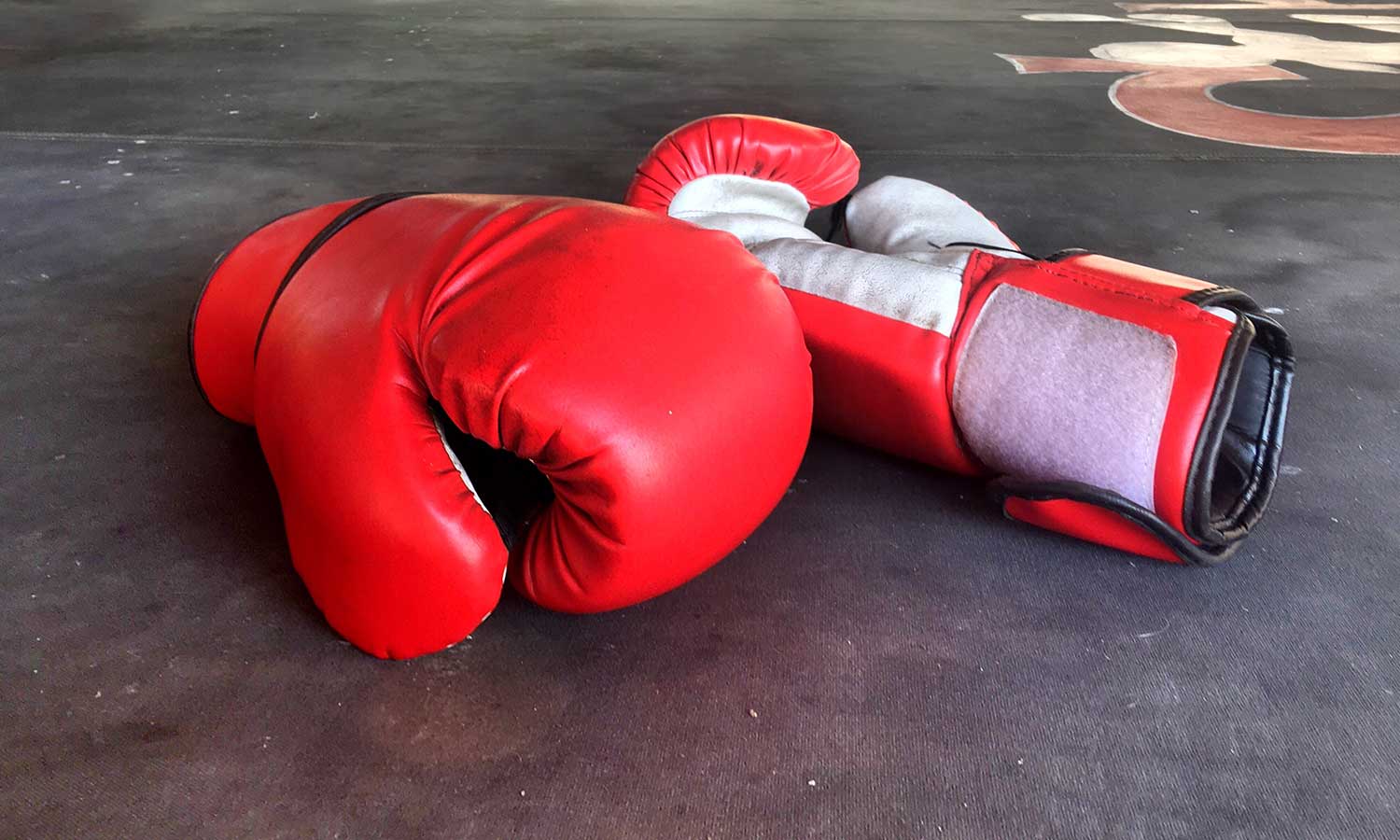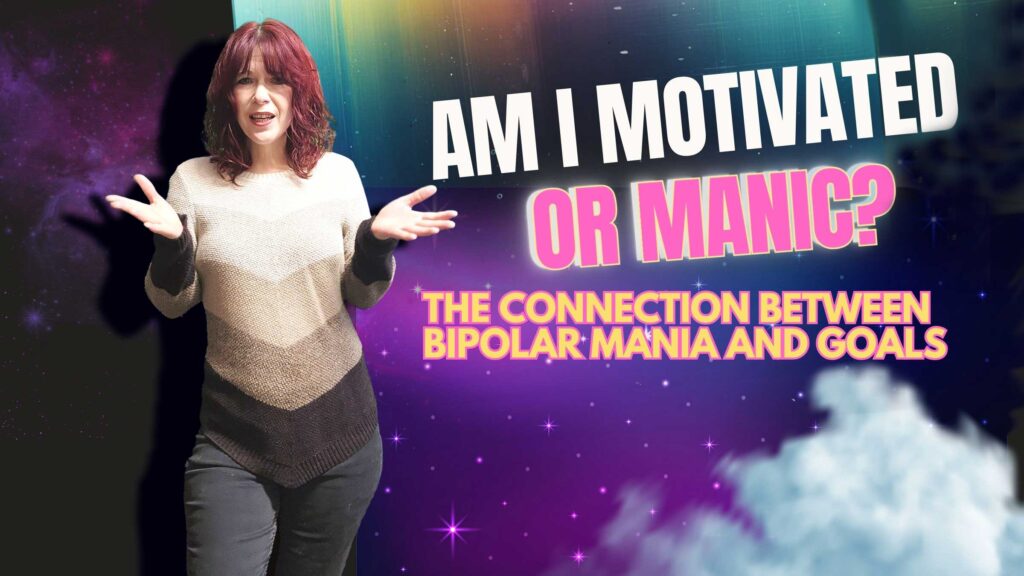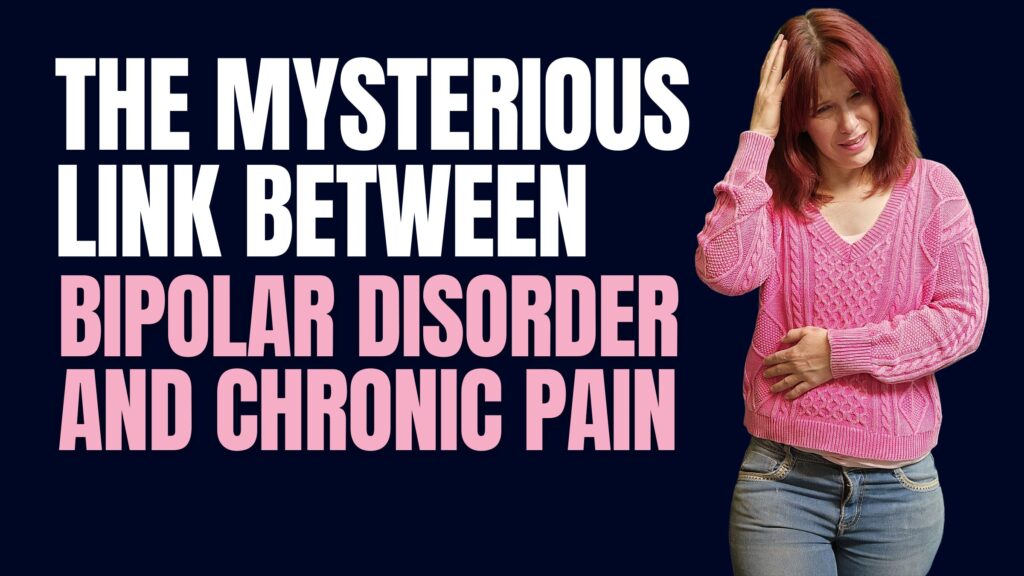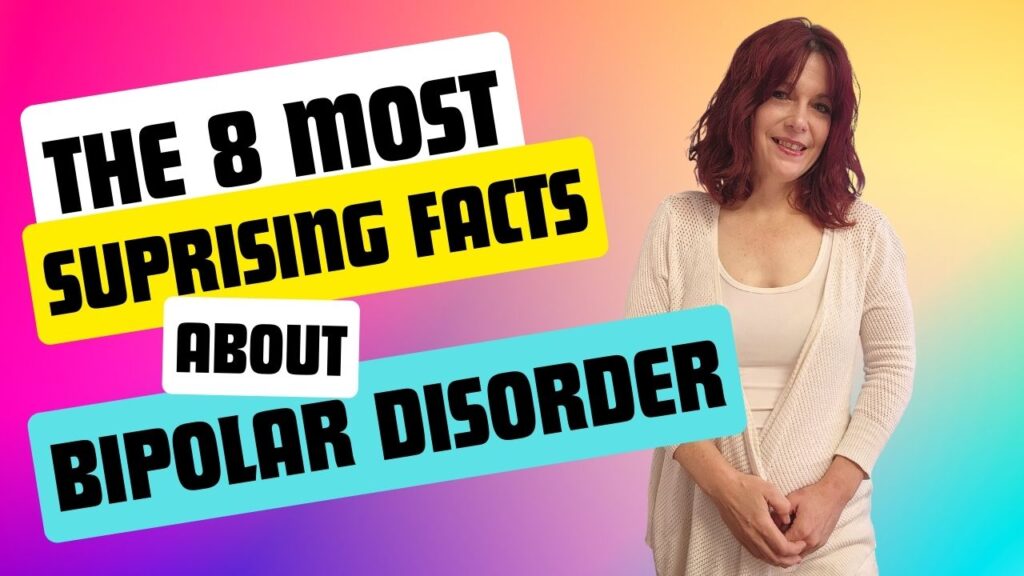Let’s learn about the surprising connection between Bipolar Disorder and chronic pain. Does Bipolar Disorder cause chronic pain?
If you have Bipolar Disorder like I do, you may have noticed that you experience pain whenever you are stressed. You may have also noticed that your episodes of depression strangely coincide with your episodes of pain. If you have noticed this pattern, you may be wondering if your chronic pain is really what’s causing your depression or if your depression could be causing physical pain. Is there a connection between Bipolar Disorder and chronic pain?
Surprisingly, there is a connection between Bipolar Disorder and chronic pain that many people are not aware of. If you suffer from chronic pain, you may have noticed that your mood changes before, during, or after an episode of pain. There are a few theories about why this happens that I am going to discuss in this post.
If you have Bipolar Disorder and also struggle with frequent episodes of pain, keep reading. I think you will find this the most informative blog post on the subject. Also, check out my YouTube video below for more information on the Mysterious Link Between Bipolar Disorder and Chronic Pain.
Why do we experience so much pain with Bipolar Disorder? It could be due to our overactive immune system or it could be because there are astonishing similarities in the neural pathways that cause pain and those that cause Bipolar depression. While the link between the two is still somewhat mysterious, we do know that Bipolar Disorder can manifest with symptoms of pain and that several chronic pain disorders are closely associated with Bipolar Disorder.
Physical symptoms of Bipolar Disorder
Bipolar Disorder is not just a mood disorder. It also has numerous physical symptoms. In addition to the emotional highs and lows of mania and depression, people with Bipolar Disorder often experience changes in their energy levels, sleep patterns, appetite, and overall physical well-being. When we are manic, we have boundless energy and don’t need much sleep. When we are depressed, we may feel completely exhausted no matter how much we sleep. Aside from changes in sleep though, there are several other physical symptoms associated with Bipolar Disorder including chronic pain.
Physical symptoms of Bipolar Disorder include
- Cognitive issues such as mixing up words or skipping words when speaking, memory loss, difficulty concentrating, or racing thoughts
- Decreased energy, fatigue, or lethargy
- Jitteriness, heart palpitation, rapid pulse, or high blood pressure
- Gastrointestinal issues such as stomach aches, nausea, vomiting or diarrhea
- Weakness, muscle aches, or joint pain
- Back, neck, or shoulder pain
- Frequent migraines and headaches
- Increase or decrease in sex drive
- Increase or decrease in appetite, binge eating, or anorexia
- Changes in sleep including Insomnia, hypersomnia, or hyposomnia
It is not uncommon for us to experience physical pain, which is usually associated with episodes of depression. There are many intersections between our physical and mental health, as well as other interesting facts about Bipolar Disorder that people just don’t know about. The link between Bipolar Disorder and chronic pain has unfortunately not been extensively studied but, I hope to provide you with some information on how the two are connected and some tips for managing chronic pain if you have Bipolar Disorder.
Chronic Pain Conditions Associated with Bipolar Disorder

Migraines are the most common chronic pain condition associated with Bipolar Disorder. However, people with Bipolar Disorder also have a higher chance of experiencing other chronic pain disorders, such as fibromyalgia and rheumatoid arthritis.
Bipolar Disorder and Migraines
An article in the American Journal of Managed Care discusses the link between Bipolar Disorder and migraines. According to the article, people have higher levels of pro-inflammatory cytokines during migraine attacks. Cytokines are molecules in our body that regulate inflammation. Pro-inflammatory cytokines encourage inflammation, and anti-inflammatory cytokines reduce inflammation.
They think that people with Bipolar disorder have an imbalance of these cytokines and this may be why so many of us also get migraines. In fact, if you have Bipolar Disorder you are three and a half times more likely to suffer from migraines. Additionally, people who experience both Bipolar Disorder and migraines generally have more severe symptoms.
We are still not completely clear on why we experience migraines with Bipolar Disorder, but we think that it’s due to our overreactive immune system. We know that inflammation occurs in both the manic and depressive phases of Bipolar Disorder, and much more significantly during manic episodes.
We also believe Bipolar Disorder causes issues with our immune response. We either produce too many pro-inflammatory cytokines or too few anti-inflammatory cytokines. These inflammatory cytokines also tend to fluctuate significantly in people with Bipolar Disorder. This may explain why we experience so much inflammation and pain, and also why our moods tend to shift after a migraine.
Essentially, our overreactive immune response during a manic episode leads to high levels of inflammation, which in turn triggers our migraine attacks. We then experience intense pain that may cause our mood to change from manic to depressed. This process is influenced by both physiological changes in inflammation and psychological factors, as pain often affects mood and energy levels, regardless of having Bipolar Disorder.
Rheumatoid Arthritis and Bipolar Disorder
Rheumatoid arthritis is characterized by chronic inflammation, joint pain, and swelling. It is also an autoimmune disorder, meaning that the body’s immune system mistakenly attacks its own tissues. This autoimmune response causes systemic inflammation and the painful arthritis symptoms people experience. While the connection between Rheumatoid arthritis and Bipolar Disorder is not as well-established as with migraines, both conditions involve dysfunction of the immune system and inflammation.
People who have Rheumatoid arthritis are twice as likely to develop Bipolar Disorder. There appears to be a connection between autoimmune disorders and Bipolar Disorder, again suggesting that our immune system may play a role in our moods. Bipolar Disorder is associated with several other autoimmune disorders as well including Lupus, Hashimoto’s thyroiditis, and Inflammatory Bowel Disease.
Fibromyalgia and Bipolar Disorder
Fibromyalgia is a chronic pain condition that affects the entire body, causing pain, tenderness, and other symptoms such as fatigue and sleep disturbances. Fibromyalgia pain is often described as a dull constant pain, but it can also cause other symptoms including brain fog, anxiety, or depression. These symptoms (including pain) can also be seen in Bipolar disorder, although some researchers think this is a separate syndrome and not fibromyalgia.
However, 25 percent of people with fibromyalgia also have Bipolar Disorder. And, there is an interesting connection between fibromyalgia and Bipolar Disorder. Both conditions have been found to be associated with higher levels of pro-inflammatory cytokines and both have been found to have abnormalities in a specific region of the brain (the HPA axis) that is responsible for regulating our stress response, mood, and metabolism.
The Relationship Between Bipolar Disorder and Chronic Pain
As you can see there is a relationship between Bipolar Disorder and chronic pain. Chronic pain is often found to be comorbid with Bipolar disorder. According to one study, approximately half of individuals with Bipolar Disorder also experience chronic pain. The prevalence of chronic pain is even higher among women, with two-thirds of women with Bipolar Disorder reporting chronic pain.
Similarly, a study conducted on military veterans also found a high occurrence of chronic pain, with veterans diagnosed with Bipolar Disorder being more likely to have pain disorders, migraines, and psychogenic pain. Data from the Veterans Health Administration indicated that veterans with Bipolar Disorder were five times more likely to experience migraines and ten times more likely to experience psychogenic pain. These findings highlight a significant connection between Bipolar Disorder and chronic pain.
What Causes Chronic Pain With Bipolar Disorder?
There are a few reasons why we believe there’s such a strong connection between Bipolar Disorder and chronic pain, but one of the most talked about is the relationship between inflammation and Bipolar Disorder. Numerous studies have found that we have a sensitive and overreactive immune system that causes us to have constant inflammation.
Pain is often caused by inflammation, which is the body’s natural response to injury or attack. When a specific area of the body becomes inflamed, it leads to increased blood flow, chemical changes, and triggers an immune response. This immune response can result in pain as a way for the body to signal that there is an injury or threat that needs attention. For example, if you have a sprained ankle, the pain signals your body to rest and protect the injured area.
How Chronic Pain Affects Our Mood
Chronic pain not only affects our physical well-being but also has a significant impact on our mood. It can lead to symptoms such as depression, anxiety, fatigue, and difficulty sleeping, collectively known as “sickness behavior.” These changes in mood and energy can make the symptoms of Bipolar Disorder worse and can make it more challenging to manage. The intense pain can trigger mood swings and increase the frequency of depression episodes.
Additionally, untreated Bipolar mania can result in higher levels of inflammation, leading to a vicious cycle of mania followed by severe pain and depression. In order to reduce chronic pain and the episodes of Bipolar depression is important to manage both the physical and emotional symptoms of Bipolar
Psychogenic Pain and Bipolar Disorder: Is it all in your head?
To make matters worse, there are psychological factors involved in chronic pain, particularly when it comes to Bipolar Disorder. The term psychogenic pain means physical pain that is caused by emotional trauma, emotional stress, or psychological reasons rather than a physical illness or injury. While nobody wants to hear that their pain is all in their head, there is significant evidence to suggest that chronic pain can be a result of emotional trauma, repressed emotions, or stress. Think back on your last episode of pain. Were you under stress when your pain occurred?
Dr. John Sarno discusses this phenomenon called Tension Myositis Syndrome in his book The Mindbody Prescription: Healing the Body, Healing the Pain. He believes that chronic pain is often a result of psychogenic pain that is created in the brain. This psychogenic pain that he calls Tension Myositis Syndrome is a result of repressed emotions, particularly rage. While this concept might seem implausible to some chronic pain sufferers, there is substantial evidence that supports his conclusions.
When it comes to Bipolar Disorder, emotional trauma likely plays a significant role in our chronic pain. Dr. Howard Schubiner, a specialist in psychophysiological disorders, explains the mind-body connection to pain in an article published in Psychology Today. He says that chronic pain is often caused by learned neural pathways, rather than structural problems.
Basically, neural pathways are the connections in our brain that allow us to process and experience different sensations, including pain. When we repeatedly experience pain, our brain creates and reinforces these neural pathways, leading to a cycle of pain. Interestingly, the neural pathways that create the sensation of pain use the same brain regions as the pathways that cause depression. This helps explain why depression and pain often go hand in hand.
In order to teach our brain to quit using these learned pathways, we have to retrain our brain. This is done through specific mindfulness practices that unlearn these misguided pathways that create pain and ultimately eliminate the brain’s need to create pain.
Tips for Managing Chronic Pain and Bipolar Disorder
Bipolar Disorder is much more difficult to manage if you experience chronic pain and can cause longer or more severe episodes of depression. Then, as you rebound from the depression, you may attempt to compensate for lost time or productivity by engaging in behaviors that lead to mania. For example, you may work too many hours, manic clean your house, or not sleep in an attempt to catch up with your life’s responsibilities. However, this is counterproductive. In order to reduce the amount of pain we experience, we have to address the underlying problems that cause the pain. This means reducing the number of hypomanic or manic episodes.
Reduce hypomania and manic episodes
Reducing Bipolar mania symptoms is one of the best ways to improve symptoms of chronic pain and the depression that goes along with it. Remember that mania can make inflammation worse, leading to more episodes of chronic pain.
- Maintain a consistent sleep schedule. We have extremely sensitive circadian rhythms and disruptions in sleep (even a couple of nights of poor sleep) can trigger a manic episode.
- Take your medications as prescribed, and as much as possible, make sure to take your medication at the same time of day.
- Avoid excessive caffeine, alcohol, cannabis, or other mood-altering substances.
- Consider the ketogenic diet. For me the ketogenic diet has been the most effective lifestyle change both for managing my Bipolar Disorder and chronic pain.
Reduce inflammation
There are several natural methods for reducing inflammation you can try. Regular exercise and self-care are simple ways to reduce inflammation in the body. Additionally, there is emerging evidence suggesting that low-dose aspirin may be beneficial for individuals with Bipolar Disorder in reducing inflammation. A study found that a low-dose aspirin regimen helped alleviate depression symptoms in Bipolar Disorder patients without causing severe side effects or impacting lithium levels. It’s worth discussing this option with your doctor as it may improve both inflammation and symptoms of depression.
Manage the stress in your life
There are several effective ways to manage stress and reduce psychogenic pain. One approach is to incorporate stress management techniques into your daily routine, such as practicing mindfulness, meditation, and journaling. These methods can help release pent-up emotions that may contribute to pain. While it’s impossible to completely eliminate stress from our lives, regularly practicing these techniques can help reduce tension and minimize the experience of pain.
Have you Experienced Chronic Pain with Bipolar Disorder?
I find it surprising that the link between pain and Bipolar Disorder hasn’t had much attention. Considering how common it is for people with Bipolar Disorder to also experience pain, you’d expect more research on this. I promise to share more insights on this topic in follow-up blog posts.
If you’ve ever noticed a pattern of pain with your Bipolar symptoms, I’d love to hear about it. And, if you have any tips or specific topics you’d like me to talk about in upcoming videos, let me know in the comments!
Recommended Books:
The Way Out by Alan Gordon
The Mindbody Prescription: Healing the Body, Healing the Pain by Dr. John Sarno
Resources
After Searching 12 Years for Bipolar Disorder’s Cause, a Team Concludes It Has Many. [Home]. (n.d.). https://www.michiganmedicine.org/health-lab/after-searching-12-years-bipolar-disorders-cause-team-concludes-it-has-many
Benedetti, F., Aggio, V., Pratesi, M. L., Greco, G., & Furlan, R. (2020, January 27). Neuroinflammation in Bipolar Depression. Frontiers. https://www.frontiersin.org/articles/10.3389/fpsyt.2020.00071/full#B8
Birgenheir, D. G., Cerimele, J. M., Cook, A. J., Crofford, L. J., Goldstein, B. I., Schoneboom, B. A., Abdin, E., Adler-Neal, A. L., Averill, J. B., Bauer, M., Boggero, I. A., Bradley, E. H., Braun, V., & Darnall, B. D. (2020, September 1). Relationships between chronic pain and mood symptoms among veterans with bipolar disorder. Journal of Affective Disorders. https://www.sciencedirect.com/science/article/abs/pii/S0165032720326756
Bortolato B;Berk M;Maes M;McIntyre RS;Carvalho AF; (n.d.). Fibromyalgia and Bipolar Disorder: Emerging Epidemiological Associations and Shared Pathophysiology. Current molecular medicine. https://pubmed.ncbi.nlm.nih.gov/26812920/
Chen, M., Jiang, Q., & Zhang, L. (2021a, January 11). The prevalence of bipolar disorder in autoimmune disease: a systematic review and meta-analysis. Annals of Palliative Medicine. https://apm.amegroups.org/article/view/60122/html
Chen, M., Jiang, Q., & Zhang, L. (2021b, January 11). The prevalence of bipolar disorder in autoimmune disease: a systematic review and meta-analysis. Annals of Palliative Medicine. https://apm.amegroups.org/article/view/60122/html
DJ;, W. W. C. (n.d.). Fibromyalgia and bipolar disorder: a potential problem?. Bipolar disorders. https://pubmed.ncbi.nlm.nih.gov/20712752/
Failde, I., Dueñas, M., Agüera-Ortíz, L., Cervilla, J. A., Gonzalez-Pinto, A., & Mico, J. A. (2013, April 15). Factors associated with chronic pain in patients with bipolar depression: a cross-sectional study. BMC psychiatry. https://www.ncbi.nlm.nih.gov/pmc/articles/PMC3642018/#B10
Kehr, Dr. B. (2022, September 9). My Moody Immunity. Potomac Psychiatry. https://www.potomacpsychiatry.com/blog/my-moody-immunity
Melillo, G. (2021, February 9). Understanding the Link Between Bipolar Disorder, Migraine. AJMC. https://www.ajmc.com/view/understanding-the-link-between-bipolar-disorder-migraine
Rosenblat, J. D., & McIntyre, R. S. (2017, October 30). Bipolar Disorder and Immune Dysfunction: Epidemiological Findings, Proposed Pathophysiology and Clinical Implications. MDPI. https://www.mdpi.com/2076-3425/7/11/144#B6-brainsci-07-00144
Schubiner , H. (n.d.). Four Questions Can Help Determine the Cause of Chronic Pain. Psychology Today. https://www.psychologytoday.com/us/blog/unlearn-your-pain/201408/four-questions-can-help-determine-the-cause-chronic-pain
Wallace, D. J., & Gotto, J. (2008, February). Hypothesis: Bipolar Illness with Complaints of Chronic Musculoskeletal Pain Is a Form of Pseudofibromyalgia. Science Direct. https://www.sciencedirect.com/science/article/abs/pii/S0049017207000807










